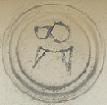One more book down for Philosophy, and I have one more review.
I love Thomas Aquinas. I admire his philosophy. I love the clear, rational, and above all precise way in which he lays out his arguments. I especially like the way he adapts Aristotelian thought for the Christian world. This little treatise, On Being and Essence, is about the metaphysical make up of all things. The short form of the argument is this:
In a simple substance (i.e. God) being = essence. The simple substance is not limited in any way.
In a separate substance (i.e. angels, the human soul) , simple substance = being + essence, where essence is equal to form alone. That is, while separate substances are limited from above because they depend on God for their existence, they are not limited from below because they have no physical matter.
In a composite substance (i.e. everything else), composite substance = being + essence, where essence = form + matter. In a human being, being comes ultimately from God (and in the more immediate sense, from one's parents), form is rational animal and matter is the body. In a table, being comes ultimately from God (and more immediately from the carpenter who assembled it), form is thing with a flat surface for putting things on and the matter is the wood, glue, nails, and etc that make up the particular table.
Thomas is more nuanced then that, and takes the time to address questions tangential to that argument, but that is the main point of the treatise.
That said, I would like to say one thing:
ANY BOOK, NO MATTER HOW SHORT, THAT CONSISTENTLY HAS MORE FOOTNOTES AND EDITOR'S COMMENTS PER PAGE THAN ACTUAL BODY TEXT IS NOT ONE THAT I WANT TO RE-READ.
Rating: 8 out of 10,
For the reason in the caps above, and because it is very difficult for the student to recapitulate. One must be able to quote his arguments all most verbatim, because if one uses the wrong words or clips the wrong corner one descends very quickly away from Orthodoxy and into heresies that were thought wiped out in the 6th century.
-Yami, who has been having to much fun with caps lock lately
Friday, November 09, 2007
Thursday, October 25, 2007
Aristotle's Metaphysics
I wanted to start my reviews with something a little highbrow, so I've chosen Aristotle's Metaphysics, specifically Book Lambda, in the translation by Hippocrates G. Apostle. This is required reading for the Philosophy of Being class I'm taking at the moment, which is why I read it.
Summery:
Book Lambda is a summery of Aristotle's Metaphysics, in which he explains the main points of his cosmology. He explains the relationship between matter and form, his theory of change, and the importance of the mover. From there, he posits the existence of an Unmoved Mover (a being a pure actuality, who exists eternally, and whose action is to contemplate himself) which causes the fixed stars to move, which in turn give movement to everything else.
Comments:
There is some debate, of course, about whether there are 55 unmoved movers or 47, or maybe even just one.
While his explanation of cosmology does not hold up to modern physics (he assumes a geocentric universe) his logical arguments display the sort of tight, sound, well ordered reasoning that one expects from Aristotle. For better or for worst, Aristotle's understandings of being, essence, causality, et cetera, have been a major influence on Western philosophy.
Rating: 7 out of 10
I love Aristotle, but the text can be both frustratingly vague and dense as marble, often at the same time. This is, I think, a side effect of the text being a compilation of his student's notes. Aristotle himself did not write any of the texts that bear his name. Both his organized style, and the arguments he makes are, however, essential for understanding later philosophers.
-Yami
Summery:
Book Lambda is a summery of Aristotle's Metaphysics, in which he explains the main points of his cosmology. He explains the relationship between matter and form, his theory of change, and the importance of the mover. From there, he posits the existence of an Unmoved Mover (a being a pure actuality, who exists eternally, and whose action is to contemplate himself) which causes the fixed stars to move, which in turn give movement to everything else.
Comments:
There is some debate, of course, about whether there are 55 unmoved movers or 47, or maybe even just one.
While his explanation of cosmology does not hold up to modern physics (he assumes a geocentric universe) his logical arguments display the sort of tight, sound, well ordered reasoning that one expects from Aristotle. For better or for worst, Aristotle's understandings of being, essence, causality, et cetera, have been a major influence on Western philosophy.
Rating: 7 out of 10
I love Aristotle, but the text can be both frustratingly vague and dense as marble, often at the same time. This is, I think, a side effect of the text being a compilation of his student's notes. Aristotle himself did not write any of the texts that bear his name. Both his organized style, and the arguments he makes are, however, essential for understanding later philosophers.
-Yami
Subscribe to:
Comments (Atom)
